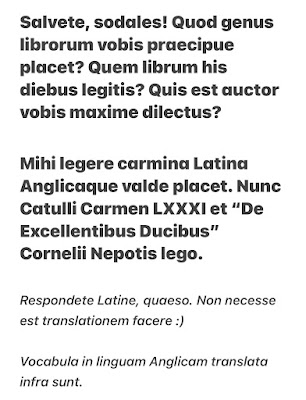Image: When you start to learn a language it can look like that -especially if, online, you see a range of levels. But, to complete specific tasks in a language, you only need a few pieces.
I refer again to David’s post:
https://www.facebook.com/.../permalink/521706370440636/
What David writes there is similar to what you would see in a UK GCSE Modern Languages examination. That’s the exam for 16-year-olds. Part of that exam is the speaking test which, unless it has recently changed, comprises 25% of the total result. There will be a series of questions on a number of different topics; none of the questions are particularly advanced, nor do they want “speeches” in the answers but rather, two or three sentences. Now, Latin doesn’t have a speaking test nor a writing test that may involve stimulus questions of a similar type e.g. write a reply to an email from a friend. However, the technique of learning is the same.
How you approach it is important.
Don’t start at the end point i.e. here’s a question, but I
don’t know how to answer it and, therefore, I won’t do it. With the greatest of
respect, learning a language – any language – isn’t going to happen that way.
Ask yourself the following questions:
1. What do I already know?
2. What can I find out?
3. What are the key structures that allow me to answer that
question in a single sentence?
4. What can I “steal”?
5. What can I lie about?
All of the posts connected to this topic give you the jigsaw
pieces you need and are designed to [i] provide the information to answer the
questions in the most basic form and [ii] allow you to expand on those answers
if you feel you can do that.
Take what you need; I’ve changed the questions to use 2nd
person singular forms so that they are being directed to you personally.
[1] Quod genus librōrum tibi maximē placet? │ What kind of
books do you like the most?
follow-up; books, writing and related topics [1]
https://adckl.blogspot.com/2024/09/230924-follow-up-books-writing-and.html
The answer, since it is asking a general question, will most
often be plural:
Carmina mihi placent. │ I like poems.
Librī ¦ dē historiā ¦ mihi placent. │ I like books about
history.
Expand if you want; “steal” words that are given in the
examples
Carmina ¦ Catullī ¦ mihi placent. │ I like the poems ¦ of Catullus.
Carmina Catullī mihi ¦ praecipuē ¦ placent. │ I ¦
particularly ¦ like the poems of Catullus.
Carmina Catullī legere mihi praecipuē placet. │ I
particularly like ¦ to read ¦ the poems of Catullus.
[2] Quis est tibi auctor maximē dīlēctus? │ Who is your
favourite author?
follow-up; books, writing and related topics [7]; people
https://adckl.blogspot.com/2024/09/240924-follow-up-books-writing-and.html
Follow the pattern:
X est mihi Y maximē dīlēctus [m.] / dīlēcta [f.] │ X is my
favourite Y.
[Cicerō] est mihi [auctor] maximē dīlēctus. │ [Cicero] is my
favourite [author].
[Meryl Streep] est mihi [actrīx] maximē dīlēcta. │ [Meryl
Streep] is my favourite [actress].
Expand if you want:
Catullus poēta Rōmānus est. │ Catullus is a Roman poet.
Marītālis in Hispāniā nātus est. │ Martial was born in
Spain.
[3] Quem librum hīs diēbus legis? │ What book are you
reading these days [= at the moment; currently]?
follow-up; books, writing and related topics [8]; What are you reading about?
https://adckl.blogspot.com/2024/09/240924-follow-up-books-writing-and_24.html
follow-up; books, writing and related topics [9]; book titles
https://adckl.blogspot.com/2024/09/240924-follow-up-books-writing-and_82.html
Librum ¦ dē architectūrā Rōmānā ¦ legō. │ I’m reading a book
¦ about Roman architecture.
Librum legō quī “__________” īnscrībitur. │ I’m reading a
book ¦ which is entitled “__________”.
Of course, if you want to speak and / or write in Latin –
and many people do – naturally you want to relate it to your own experience.
However – and this is where lying comes in – if the book you’re reading is “The
Curious Incident of the Dog in the Night-Time”, and you don’t know how to say
it, then it might be a plan to say you’re reading “Winnie the Pooh”!
Librum nūper legī quī “Winnie Ille Pooh” īnscrībitur. │ I
recently read a book entitled “Winnie the Pooh”.
It isn’t about reality, but about practising the key
structures.
[4] Keep stealing; look again at the post about the
17th century bookstore.
follow-up; books, writing and related topics [5]; in a 17th century bookstore
https://adckl.blogspot.com/2024/09/230924-follow-up-books-writing-and_38.html
Expand if you want:
Multōs librōs saepe emō quia in oppidō meō est taberna
librāria magna. │ I often buy a lot of books because there’s a big book store
in my town.
Librī meī per pluteōs ¦ dispōnuntur. │ My books are arranged
¦ on shelves.
[5] One final point, and one that I made again and again
when I was teaching languages: don’t kill a conversation. The excerpt from the
UK comedy programme “Come Fly with me” illustrates that point and I used that
excerpt, and similar ones, with so many students.
Imagine you can’t stand reading and have never read a book
in your life. Then the most important word is ‘but’; manipulate the answer:
Librōs rārō / numquam legō sed … │ I rarely / never read
books but …
… mūsicam audiō. │ I listen to music.
… pingere mihi placet. │ I like painting.
… pelliculam dē gladiātōribus nūper spectāvī. │ I recently
watched a movie about gladiators.
i.e. Don’t be like Tommy in the video: think of something to
say


No comments:
Post a Comment